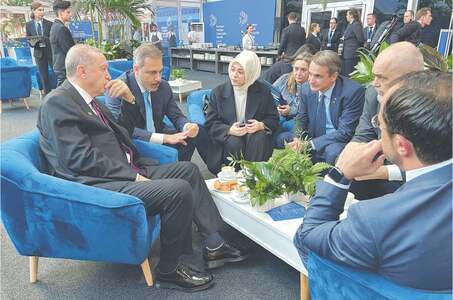TRIPOLI: Libyans are shaking off decades of deprivation resulting from an iron-fisted socialist rule, international isolation and sanctions to savour the joys of their new market economy.
Gone are the days of having to queue outside gloomy state shops to buy subsidised consumer goods in Libya, which is an OPEC member and Africa’s number two oil producer with reserves estimated to total 42 billion barrels.
Thanks to high oil prices, a promise by flamboyant leader Moamer Qadhafi to give the people a share of the country’s multi-billion oil revenues and the government’s economic reforms drive, Libyans have embraced consumerism.
Designer boutiques dot the posh Gargaresh avenue of the capital Tripoli, where Libyans can shop for the latest fashions as well as stop in a US-style fast-food eatery for a late-night slice of pizza.
Amid traffic jams, young Libyan men slip behind the wheel of their four-wheel drive cars or sporty BMW models and cruise the streets until the early hours, music blasting from their car stereos.
“We have suffered enough, especially during the (UN-imposed) embargo,” from 1992 until 2003, said Ahmad, a 35-year-old banker, who declined to give his surname.
“It is time we catch up on those lost years.”
Private investors have tapped into the mood of the country of nearly six million inhabitants – which imports 90 per cent of its consumer goods – by transforming a dismal state-run market into Tripoli’s first superstore.The four-storey modern temple of consumerism opened in September drawing a flow of eager customers who pushed and shoved their way into the mega-store.
“Finally we can shop like everyone else,” said a 40-year-old woman.
The investors, including a charity run by Qadhafi’s daughter Aisha, poured seven million dollars into the project.
The scheme reflects a decision by the government to shake off Libya’s staunch socialist economy and embrace reforms and globalisation since mending its ties with the West.
The turning point came when Qadhafi publicly abandoned the quest for weapons of mass destruction at the end of 2003.
Libya has since 2000 been working to dismantle the central economy adopted in the 1970s and replace it with a market economy, by encouraging privatisation to create more jobs and phase out subsidies burdening the economy.
At the same time the government has hiked the salaries of civil servants by 50 per cent to bolster purchasing power.
Three years ago credit cards appeared in Libya and banks are offering easy credit terms with preferential rates to private investors.
The result has been a surge in restaurants, shops and apartments.
And on the streets of Tripoli even the omnipresent portraits of Qadhafi have given way to placards advertising a variety of goods and projects.
But this over-injection of cash and an increase in demand have sent food prices sky-rocketing.
Inflation rose from 1.4 per cent in 2006 to reach 6.2 per cent in 2007 while it hit a record of nearly 12 per cent for the first seven months of 2008, according to the central bank.
Many families are trailing behind, despite state assistance to the poor.
“Life is becoming more and more expensive and families are more demanding,” said Mohammed, who drives a cab at night and teaches English by day to help make ends meet.
“You have to work hard in order to earn a good living and satisfy everyone,” he said.
This father of three complained that Libya was heading from “stifling socialism to wild capitalism.”—AFP













































Dear visitor, the comments section is undergoing an overhaul and will return soon.